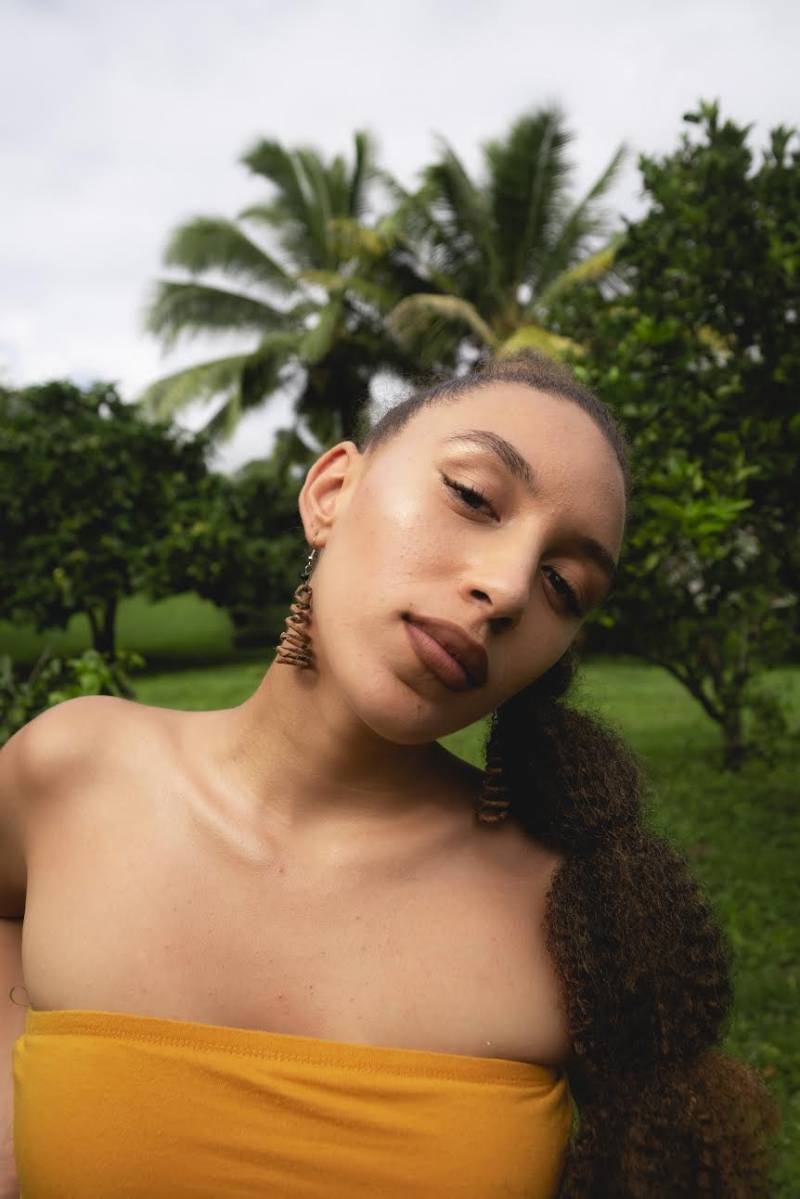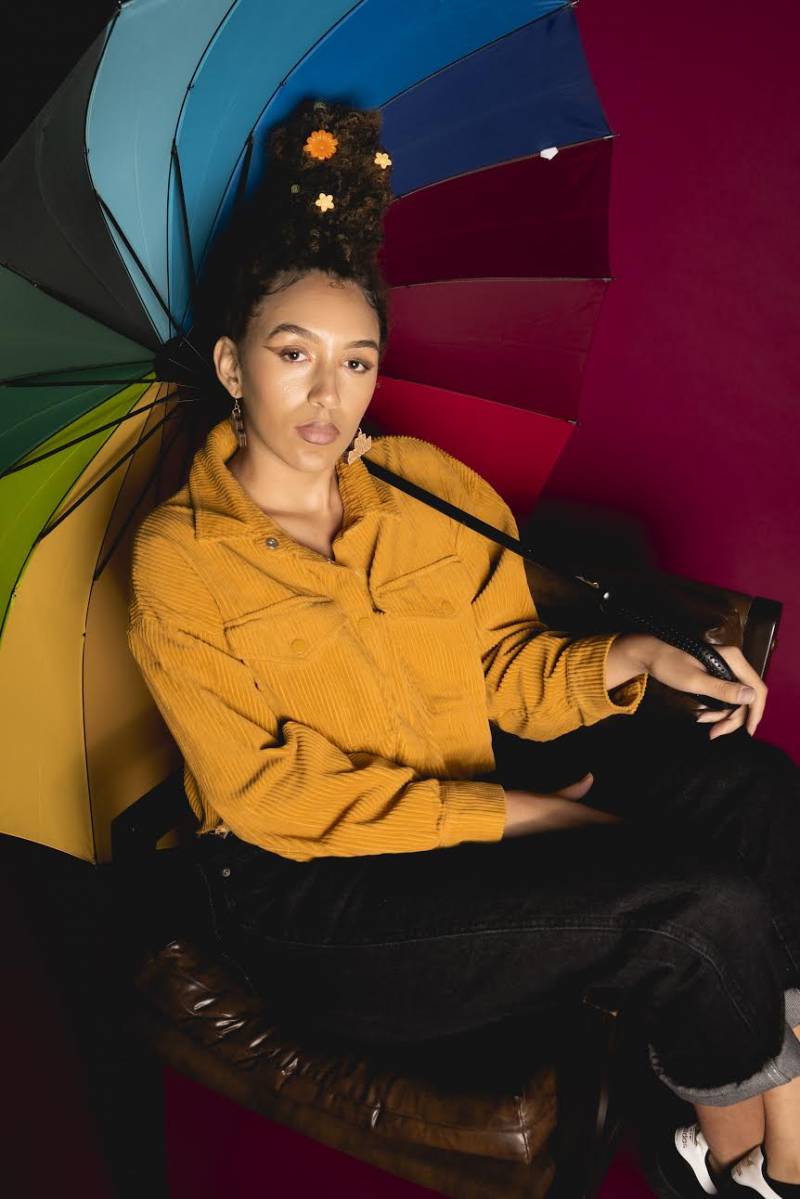
Over 4 weeks, Rightnowish is featuring artists with local roots who are taking the sounds of the Bay to a national stage.
Neo-soul and hip-hop artist Jada Imani gets her inspiration from a range of lived experiences: parking tickets, lessons from her parents, and Mac Dre lyrics.
Despite the pandemic, Jada has been dropping three-track EPs every first Friday since October, and plans to continue to do so until March. It’s a legacy of the collaborations and vibe she cultivated while organizing and hosting First Friday events at the Alan Blueford Center in Oakland for over 3 years.
While honoring her origins, she’s also incorporating inspiration from her new surroundings — like Hawaiian tree frogs.
This week on Rightnowish we talk to Jada Imani about astrology, ‘high vibration clapbacks’ and how music was her access to culture when she was a small girl in a small town.

Below are lightly edited excerpts of my conversation with Jada Imani.
PEN: Where did you start learning about hip hop culture?
JADA: I was born into it because my parents were both very young hip hop heads when they had us. And music was the only thing that we really had to grasp on to when it came to culture… We moved to the Bay when I was about 10 years old. But before that, we were in kind of the rural Midwest, in this little town called Belleville, right outside of east St. Louis. There wasn’t much happening, it was kind of desolate in a way. So it was hip hop and music that gave me life.
JADA: I think both of my parents have always been very conscious of the world they live in… And my dad especially was always very radical and very pro Black. And just like ‘you need to understand the world is not set up for us.’ And the music was the medium that he taught me through…
PEN: How has the Bay influenced your art?
JADA: Oh, my gosh, in so many ways! The Bay taught me how to dance! The Bay has also influenced a lot of my style and the ability to rock thrift shops, not because that’s all you can afford growing up, but because you can make that fly.
JADA: One thing that I really admire about the Bay is that there is a strong activist history and there’s also a strong hyphy history. And when we’re talking about bringing those sounds together, like, what does it mean to talk about identity and power over a Bay slap rap? But, yeah, it’s hard to say what the Bay hasn’t done for me. I owe so much to the Bay [laughs] Especially with the first project we sampled Mac Dre, and it was like an ode to the Bay and that was like part of the tone.
PEN: You mentioned the Mac Dre line… That’s what inspired me to ask that question. You sampled the line “sometimes I’m not myself, sometimes I’m another man.”
JADA: I really enjoyed that line in particular because he was like, you don’t know who I am. Or I can recreate who I am, or like, you might see me one way because of the body I live in, but, you know, what else is there? Also it’s just like some like sassy clapping back against misogyny. I was like sixteen feeling myself. Because so much of the reason why I feel like I couldn’t talk is because I was born into a girl’s body, and so much of what inspires me to write is clapping back at the patriarchy.
PEN: It’s a high vibration clapback, if you will.
JADA: HA! Let’s go! High vibration clap back. I love it.
PEN: But another line that stands out to me correct me if I butcher it… “reading looks reading books, reading minds, reading charts.” Did I say that right?
JADA: “Reading books, reading charts, read myself, it’s a work of art, way more work than to fall apart…”
JADA: I was really– and I still am– an astrology nerd. So reading birth charts was part of my hustle when I didn’t want to get a nine to five and I wanted to only do things I genuinely enjoyed. I read birth charts for people. And then reading myself, you know, introspection is hard work, but you can’t let yourself fall apart. You got to keep reading into it.
PEN: … So, you’re calling us from Hawaii right now, where you’ve been for months, is it influencing the music that you’re producing?
JADA: That’s such a big question because I’m constantly processing it… how few black folks are here. I see more white folks than brown folks, indigenous folks out here. And I’m like, who gets to be here, who doesn’t and why? I’m really grateful to have the access to the kind of retreat that I need to grow and heal from my own, like, hurts and things. And I’m hella grateful for that… And in terms of the overarching narrative that’s going on here with the history of colonization and how it shows up in the present day. I think about it all the time. There’s colonization all over, in the Bay, like there’s gentrification, all these things. But it hits different here. You know, it really does.
JADA: … The coqui frogs are really loud at night. They sound like birds. And so when I’m recording at night, they get into the recordings of the songs. And so it ended up being the whole soundscape of an EP… Literally sounds of rainforest entering the music now [laughs]
PEN: So being that your parents put a seed in you in terms of like hip hop history, culture, the importance of the art. What role do you play?
JADA: I think I’m a weaver of community, like to hold space and open space whether it be the community center or a cafe where folks can cipher, for poets or hip hop artists to come together and see each other’s craft and like, love on each other…

Rightnowish is an arts and culture podcast produced at KQED. Listen to it wherever you get your podcasts or click the play button at the top of this page and subscribe to the show on NPR One, Spotify, Apple Podcasts, TuneIn, Stitcher or wherever you get your podcasts.

